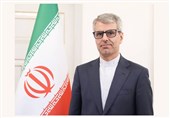Iranians Preparing to Celebrate Yalda Night Virtually
TEHRAN (Tasnim) – Iranians are gearing up to celebrate one of the most ancient Persian celebrations called Yalda Night, the longest night of the year in the Northern Hemisphere, virtually due to COVID-19 pandemic.
For almost a year now, the COVID-19 pandemic has been the uninvited guest of the people across the world, forcing everyone to change their lifestyle; a new Yalda Night is approaching but this year Iranians must stay home, despite their thousand-year-old tradition of family gatherings.
Falling on December 20 this year, Shab-e Yalda needs the empathy of the Iranian nation in the fight against the coronavirus, as people should stay home, despite their important tradition.
The outbreak reached its peak concurrent with the Iranian New Year celebration (March 21), which made Nowruz different from years and even centuries ago.
Yalda Night (Shab-e Chelleh) is a Persian winter event that is commemorated on or around December 20 or 21 each year.
Today, Yalda celebrations have become a social occasion when friends and family gather to eat, drink and read poetry (especially Hafiz) until after midnight.

Each member of the family makes a wish and randomly opens Hafez's book of poems and recites the poem, which is believed to be an interpretation of the wish.
Fruits, particularly pomegranates and watermelons, and nuts are served in this night. The fruits signify the hope for having a fruitful spring and summer.
The red-colored fruits are believed to symbolize the crimson hues of dawn and glow of life, invoking the glory of Mithra. Pomegranates with angelica powder are also believed to protect individuals against the Devil.

Central Asian countries such as Afghanistan, Tajikistan, Uzbekistan, Turkmenistan and some Caucasian states like Azerbaijan and Armenia share the same tradition as well and celebrate Yalda Night annually at this time of the year.
Yalda Night was officially added to Iran's List of National Treasures during a special ceremony in 2008.
The annual winter ceremony manifests the traditional concept of light and good prevailing over darkness and evil in the ancient Iranian religion.






